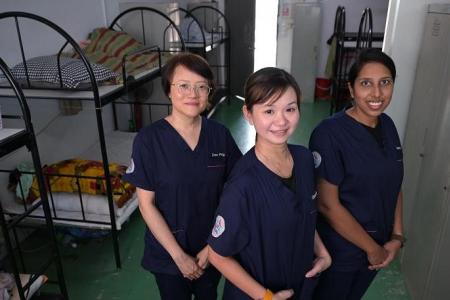Nurses visit migrant workers’ dorms to care for the sick
Bedridden from a stroke, and staying alone in a dormitory room, a migrant worker ate beside a bucket which he relieved himself in.
Seeing the worker’s living arrangement shocked Ms Eileen Ng, a nurse with the Ministry of Manpower’s (MOM) Assurance, Care and Engagement (ACE) group, which supports migrant workers.
Upon her recommendation, the worker’s employer assigned a buddy who could care for him round the clock.
The bucket was also removed.
Ms Ng, 38, is one of three nurses in ACE’s nursing team, which was formed in July 2021, during the Covid-19 pandemic.
They provide follow-up care for migrant workers at their dormitories after they have been discharged from hospital.
On average, the nurses handle about 50 cases a month in total. They include workers who suffer work injuries or chronic illnesses, and even those who attempted suicide. The nurses teach the workers about wound care, medication and other healthy practices such as exercise.
On helping the bedridden worker, Ms Ng said she felt he should not have been subjected to such treatment. “That’s when I thought, I really had to step up for him,” she added.
Dr Lee Heow Yong, chief medical officer of ACE and the occupational safety and health division at MOM, said the pandemic underscored the need to strengthen healthcare resilience in the migrant worker community.
Apart from implementing a primary healthcare system for the workers, ACE formed the nursing team as it recognised the need for follow-up care, said Dr Lee.
The nurses spoke to The Straits Times on July 29 at Sungei Tengah Lodge, off Old Choa Chu Kang Road. All three are married with children, and having families of their own helps them to better empathise with the workers.
Ms Ng worked for 14 years as a nurse in a public hospital’s emergency department and other healthcare organisations before joining the team.
Ms Ng, whose husband is a psychologist, said: “(In a) hospital, every year (there are) nurses joining. But here, it was newly set up. Somebody’s got to keep this thing up, so I thought I can do my part by joining.”
Ms Hema Devi Chandran, 38, joined in October 2023, after 11 years as a nurse at public hospitals and polyclinics.
She said her husband, who works as a master mariner, was initially apprehensive about her new job.
“(He asked,) ‘Is it safe for you to go down and meet them? Because it’s in a male-dominated place and you’re the single female there’.”
The mother of three boys aged two to nine added: “My family and I have come to realise that these stereotypes are unfounded. They are fellow humans with families, hopes and dreams, and deserve to be cared for too.”
Last to join the team in November 2023 was Ms Wee Chen Ping, 52, a former operating theatre nurse.
One of the first workers she visited was a Bangladeshi man who suffered 74 per cent chemical burns on his body after a workplace accident.
The first time Ms Wee visited his isolation room at the dormitory, she saw tears well up in his eyes.
She said: “I guess if you are desperate to talk to someone, or have someone care for you, you can have a moment of weakness.”
Ms Wee, who has a son, listened as the worker talked about his children. She also reminded him to apply cream on his burn scars.
The nurses also help with emotional scars, by offering mental health support and referring migrant workers to professional counsellors from charities such as HealthServe.
Once, Ms Ng spoke to a worker in his 20s who had attempted suicide. He had quarrelled with his parents over money, and he felt he was not earning enough.
Ms Ng, who has four children aged four to 13, encouraged him to speak to his supervisors about going for upgrading courses and to plan for a promotion.
She said: “After that, he texted me and said, ‘Sis, I feel better right now. My mum and dad also thank you for it’.”
Ms Hema received a similar message of appreciation from a worker who called her before his flight back to India. Due to the worker’s heart condition, his employer had decided to send him home.
Over a few months before he left, Ms Hema listened to his worries.
The 50-year-old told her: “Meeting and speaking to you was like meeting God.”
Dr Lee said that since the nursing team was formed, they have seen an improvement in migrant workers’ compliance with follow-up treatment at medical centres, leading to better recovery outcomes.
He added that ACE is planning to train its Forward Assurance and Support Team (Fast) officers on common health conditions, so they can better help workers who need urgent medical attention.
Fast officers oversee migrant workers’ well-being and support dormitory operations.
On why she continues with her work, Ms Ng said: “Whenever I receive messages from them about returning to work, and I see their smiles, that keeps me going.”
Get The New Paper on your phone with the free TNP app. Download from the Apple App Store or Google Play Store now


